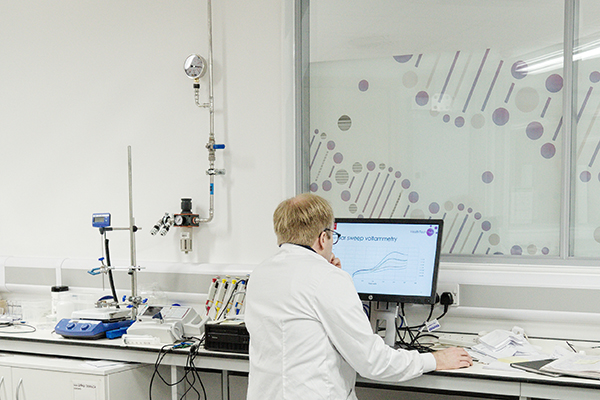Innovative biosensor technology developed at UWE Bristol wins prestigious science award

A new biosensor that monitors intravenous anaesthesia has won the Royal Society of Chemistry’s prestigious Emerging Technologies Competition 2021.
The sensor, developed in collaboration with UWE Bristol’s Health Tech Hub and Bath-based medical company Somnus Scientific, measures the levels of propofol (the most commonly used intravenous anaesthetic agent) in the bloodstream, making it safer for patients while offering a more cost-effective and sustainable anaesthesia option for healthcare providers.
Evidence suggests that intravenous anaesthesia is often safer and more effective than the more commonly used gaseous anaesthetics, with patients experiencing fewer complications and recovering faster. This improves patient safety, minimises side effects and facilitates a smoother recovery. It also has cost-saving implications as healthcare providers are able to discharge patients sooner than if using the gaseous alternative.
Despite this, gaseous anaesthesia has remained the preferred choice for doctors, as they are able to monitor levels of the anaesthetic in the breath where they have been unable to do so in the blood – until now.
The unique biosensor will for the first time be able to quickly and easily measure the level of propofol in the patient’s blood, enabling clinicians to personalise the depth of sedation or anaesthesia for each patient.
Professor Richard Luxton, Director of the Institute of Bio-Sensing Technology at UWE Bristol, said: ‘‘As far as we’re aware, this is the first biosensor in the world to measure the level of anaesthetic in the blood in real-time at the patient’s bedside. It’s an exciting piece of technology, which could revolutionise healthcare across the world and improve patients’ experience.
‘‘As well as having health advantages and being more cost-effective, intravenous anaesthetic is also much more sustainable than the highly potent anaesthetic gasses. The emissions produced by the anaesthetic gasses currently used in the UK are equivalent to the emissions produced by the one million NHS staff who commute to work every year in their vehicles. Our new biosensor technology can benefit both people and the planet and we’re delighted that its potential has been recognised by the Royal Society of Chemistry Awards.’’
UWE Bristol and Somnus Scientific have been working in collaboration since November 2018 with the University contributing expertise and research from the fields of clinical chemistry, electronic engineering, bio-sensing and analytical chemistry to develop the sensor at their Health Tech Hub on Frenchay Campus.
The award from the Royal Society of Chemistry recognises Somnus and UWE Bristol’s work in developing a product that will fulfil an unmet need in global healthcare. The competition saw 24 finalists pitching to an internationally-renowned panel of judges from some of the world’s largest and most successful organisations. As a winner, Somnus now gains a share of no-strings funding and support to accelerate its work and bring cutting-edge science to the real world for the benefit of society.
Speaking of the award, Co-Founder and CEO of Somnus, Dr Tim Craft, said: “I’m astonished and lost for words, but I’m absolutely delighted. It’s a fantastic result for us. The award also gives us the opportunity to network and be in contact with and mentored by some real experts in the industry, which is just fantastic – I’m over the moon.”
Related news

10 February 2026
Work by UWE Bristol lecturer features in Government’s National Cancer Plan
Work by a UWE Bristol academic has been included in the Government’s National Cancer Plan.

23 January 2026
On-demand minibus services beneficial in rural areas but face financial challenges, trials suggest
Trials of ‘demand responsive transport’ minibus services boosted connectivity for people in rural and suburban areas, according to a new report produced by UWE Bristol researchers.

18 December 2025
UWE Bristol professor appointed National Institute for Health and Care Excellence CEO
Jonathan Benger CBE, Professor of Emergency Care at UWE Bristol, has been appointed as the new chief executive officer of the National Institute for Health and Care Excellence (NICE).

17 December 2025
Findings revealed from first UK study into experiences of mothers who are survivors of rape pregnancy
UWE Bristol academics have revealed the findings of the first UK-based study of the experiences of mothers who are survivors of rape pregnancy.

11 December 2025
Social media influencer work is far more demanding than it looks, research finds
A study exploring the mental health impacts of social media influencer work has revealed that life online is far more demanding than it appears.

25 November 2025
UWE Bristol experts join film Q&A exploring music and melodrama
Academics will take part in the Cary Comes Home Festival, with a post-screening Q&A exploring music, melodrama and emotional storytelling in classic cinema.

17 November 2025
Urgent reform needed to support ambulance-delivered end of life care, study finds
More than three quarters (78 per cent) of paramedics sometimes fear doing the wrong thing when caring for people in the last year of life, new research has found.

13 November 2025
Bristol’s screen industry experiences “boom-and-bust cycle” after post-pandemic recovery, new research from UWE Bristol finds
New research from UWE Bristol provides detailed insight into Bristol's screen sector.

13 November 2025
New AI research to revolutionise animal welfare
A UWE Bristol research project will combine behavioural science and AI to create technology that understands not only what animals do, but how they feel.

10 November 2025
Lessons from Low Traffic Neighbourhoods will drive better public engagement, study finds
Lessons from Low Traffic Neighbourhoods have informed a new toolkit to improve engagement with the public on challenging local street issues.

06 November 2025
First-of-its-kind study aims to help more people spend their final days at home
A new study will explore how architectural design could support end-of-life care in domestic settings.

29 October 2025
UWE Bristol academic unveils breakthrough in energy-efficient AI at NATO science forum
Dr Jonathan Lancelot has developed a new form of AI that could transform how intelligent machines operate in space, defence, and remote environments.






